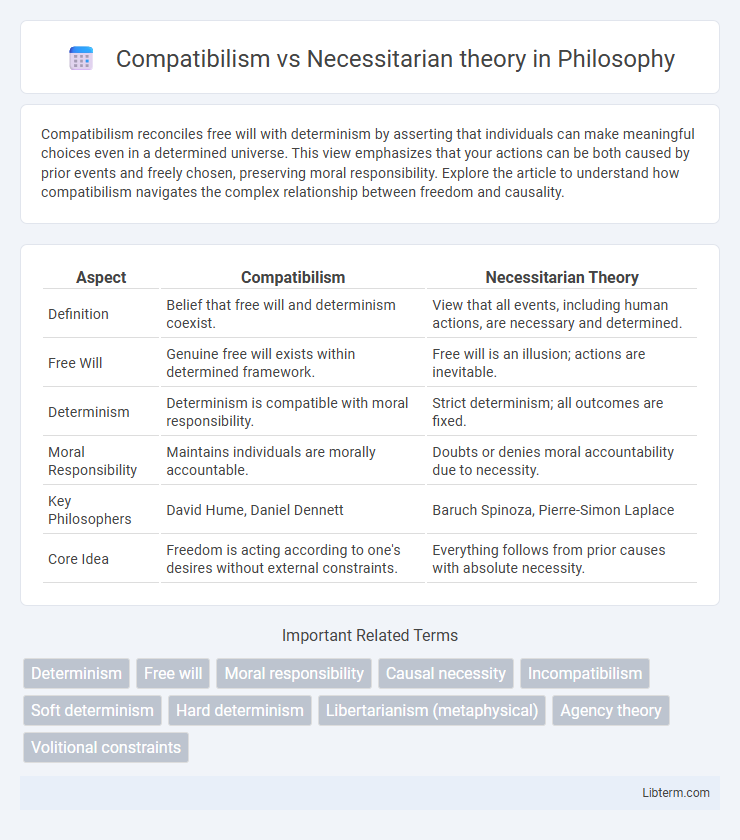Compatibilism reconciles free will with determinism by asserting that individuals can make meaningful choices even in a determined universe. This view emphasizes that your actions can be both caused by prior events and freely chosen, preserving moral responsibility. Explore the article to understand how compatibilism navigates the complex relationship between freedom and causality.
Table of Comparison
| Aspect | Compatibilism | Necessitarian Theory |
|---|---|---|
| Definition | Belief that free will and determinism coexist. | View that all events, including human actions, are necessary and determined. |
| Free Will | Genuine free will exists within determined framework. | Free will is an illusion; actions are inevitable. |
| Determinism | Determinism is compatible with moral responsibility. | Strict determinism; all outcomes are fixed. |
| Moral Responsibility | Maintains individuals are morally accountable. | Doubts or denies moral accountability due to necessity. |
| Key Philosophers | David Hume, Daniel Dennett | Baruch Spinoza, Pierre-Simon Laplace |
| Core Idea | Freedom is acting according to one's desires without external constraints. | Everything follows from prior causes with absolute necessity. |
Introduction to Compatibilism and Necessitarian Theory
Compatibilism asserts that free will and determinism coexist, emphasizing that human choices can be free even when events are causally determined. Necessitarian theory, in contrast, posits that every event, including human actions, is necessitated by prior states of the world, leaving no room for alternative possibilities. This foundational contrast shapes ongoing debates in philosophy regarding moral responsibility and the nature of freedom.
Defining Compatibilism: Key Concepts
Compatibilism asserts that free will and determinism coexist, defining free will as the ability to act according to one's desires without external coercion, even if those desires are determined by causal laws. Central to this theory is the concept of moral responsibility, which remains intact because individuals are seen as agents capable of reflection and rational decision-making. Compatibilism contrasts with necessitarian theory, which posits that all events, including human actions, are predetermined with no room for alternative possibilities or genuine choice.
Understanding Necessitarian Theory
Necessitarian theory asserts that every event, including human actions, is determined by an unbreakable chain of prior conditions governed by causal laws, leaving no room for alternative possibilities. Unlike compatibilism, which reconciles free will with determinism by redefining freedom as the ability to act according to one's desires, necessitarianism denies genuine free will because all choices are predetermined. This theory emphasizes causal inevitability, arguing that all occurrences are the necessary outcomes of preceding states, making human behavior strictly the result of deterministic processes.
Historical Origins and Philosophical Background
Compatibilism, tracing back to ancient Stoic philosophers like Chrysippus, asserts that free will and determinism coexist, emphasizing moral responsibility within deterministic frameworks. Necessitarianism, prominently advanced by philosophers such as Baron d'Holbach in the 18th century, insists on strict determinism where every event is causally determined with no genuine freedom. Both theories emerge from ongoing debates in metaphysics and ethics about the nature of freedom, causality, and moral accountability.
Major Proponents and Philosophers
Compatibilism, championed by philosophers like David Hume and Thomas Hobbes, asserts that free will and determinism can coexist, emphasizing the role of internal motivations in voluntary actions. Necessitarian theory, advocated by figures such as Baruch Spinoza and later expanded by philosophers like Arthur Schopenhauer, argues that all events, including human actions, are determined by preceding causes in a causal chain. These major proponents continue to influence contemporary debates on moral responsibility and the nature of freedom.
Free Will and Moral Responsibility: Contrasting Views
Compatibilism asserts that free will is compatible with determinism, allowing individuals to be morally responsible for actions influenced by causal chains. Necessitarian theory denies genuine free will, arguing that all events, including human decisions, are predetermined by prior causes, thereby challenging traditional notions of moral responsibility. These contrasting views highlight fundamental debates within philosophy about whether moral accountability requires indeterministic freedom or can coexist with determinism.
Causality and Determinism in Both Theories
Compatibilism asserts that causality and determinism coexist with free will by redefining freedom as acting according to internal motives without external coercion, maintaining that deterministic laws govern actions while preserving moral responsibility. Necessitarian theory, grounded in strict determinism, claims every event is the inevitable result of preceding causes, denying genuine free will and positing that causality dictates all occurrences with absolute necessity. Both theories center on the role of causality and determinism, but compatibilism reconciles determinism with freedom, whereas necessitarianism emphasizes unbroken causal chains that obliterate personal agency.
Criticisms of Compatibilism
Compatibilism faces criticism for its perceived inability to fully reconcile free will with determinism, often accused of redefining free will to fit deterministic frameworks rather than preserving genuine autonomy. Critics argue that compatibilist accounts, such as those proposed by philosophers like Daniel Dennett and Harry Frankfurt, overlook the deeper metaphysical implications of causal determinism, leading to a form of "illusionism" about freedom. Furthermore, the necessity to interpret freedom as mere freedom from coercion or external constraint is seen as insufficient to capture the intuitive notion of moral responsibility.
Critiques of Necessitarian Theory
Necessitarian theory faces critiques for its denial of genuine freedom, arguing that if every event is predetermined, moral responsibility becomes meaningless. Critics highlight the theory's inability to account for human agency and the experience of choice, suggesting it conflicts with common intuitions about accountability. Compatibilism counters by reconciling determinism with free will, preserving responsibility while acknowledging causal necessity.
Contemporary Relevance and Future Directions
Compatibilism remains influential in contemporary debates by reconciling free will with determinism through a nuanced understanding of moral responsibility, widely applied in legal and ethical discussions. Necessitarian theory, asserting that all events are determined by prior causes, challenges compatibilist claims by emphasizing causal determinism's implications for human agency. Future directions include integrating neuroscientific findings to refine these theories, fostering interdisciplinary approaches that address the complexities of human decision-making in an increasingly technology-driven society.
Compatibilism Infographic

 libterm.com
libterm.com